-
 Published: Mar 28, 2025
Published: Mar 28, 2025
-
 12 min. read
12 min. read
-
 Celeste Yates
Celeste Yates Content Writer
Content Writer
- Celeste has worked in the online marketing space for twenty years. She has written for sectors including tourism, sustainability, education, lifestyle, food, and marketing. You can find her work featured by Green Building Media South Africa, Stodels Gardening, and The Post House Hotel. In magazines, you may have seen her in The Cape Times, Oprah South Africa, and The Property Magazine. While you can find her writing up on the latest SEO trends and exploring digital techniques during the day, her love of story-telling carries on in enriched games and books after hours.
Key takeaways: How to increase organic traffic
- 50% of marketers say search engine optimization (SEO) provides a better return on investment (ROI) than any other marketing strategy.
- To boost your website’s organic traffic, you must regularly publish content, optimize your pages for humans, and implement technical SEO best practices.
Jane has worked tirelessly for months to set up her brand-new website for her small business. She finally launches her website and can’t wait to start reaching people who want to buy her products. But after a few months of waiting, she’s not getting a lot of new people to visit her site. So, what could Jane do to get more customers?
The best way for Jane to earn more leads and revenue is to learn how to increase organic traffic. If Jane can learn strategies to increase traffic, she can improve her shop’s performance online. Luckily for Jane, and you, we’ve got the information necessary to learn how to increase organic traffic to your website and succeed in 2025.
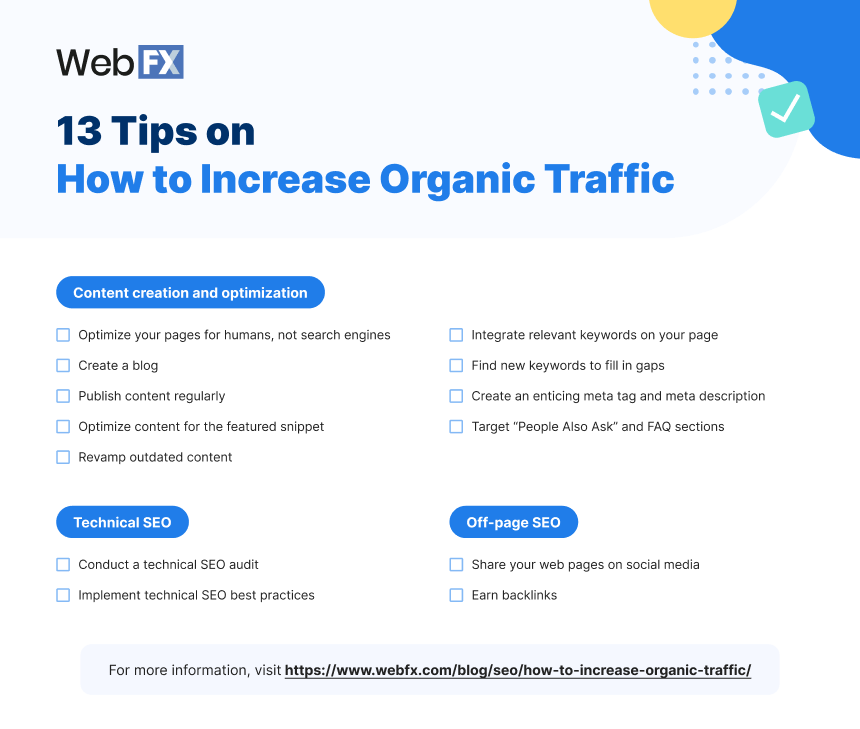
13 tips on how to increase organic traffic
Fun fact: 50% of marketers say search engine optimization (SEO) provides a better return on investment (ROI) than any other marketing strategy. That’s why it makes sense for businesses to invest in strategies to boost their organic traffic.
Here are 13 practical tips:
- Optimize your pages for humans, not search engines
- Create a blog
- Publish content regularly
- Optimize content for the featured snippet
- Integrate relevant keywords on your page
- Find new keywords to fill in gaps
- Address search intent by minding “People Also Asked” and FAQs
- Create an enticing meta tag and meta description
- Conduct a technical SEO audit
- Implement technical SEO best practices
- Share your web pages on social media
- Earn backlinks
- Revamp outdated content
1. Optimize your pages for humans, not search engines
Since search engines determine your search results ranking, many companies will try to optimize their sites to appease search engines. The reality, however, is that search engines turn to users to help determine how a page ranks.
Focus on writing content for humans first and optimizing their experience on your pages. This involves at least three things:
- Writing helpful content for your audience
- Making your website mobile-friendly (because 53% of global search traffic comes from mobile devices)
- Making your website accessible, enabling all users to view and access your content properly.
2. Create a blog
Blogging is one of the most effective ways to reach your audience. Useful and engaging blog content can drive traffic to your website, and establish your authority in your industry.
You can create various types of blog content, such as the following:
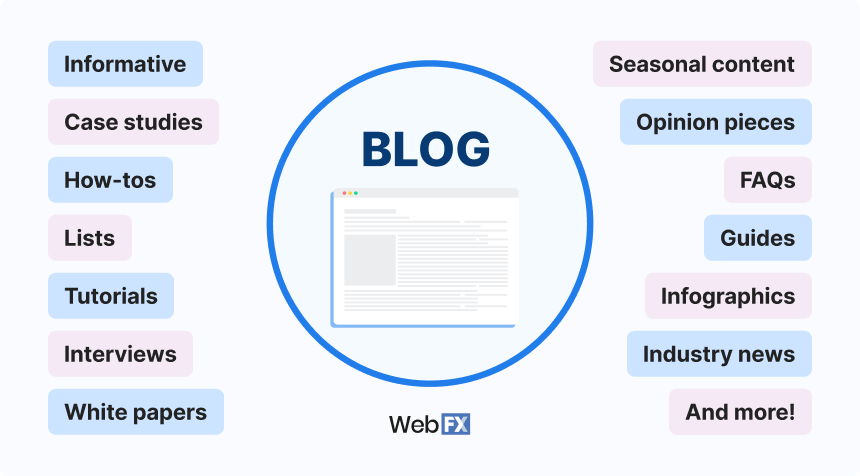
Regardless of the format of your blog, the critical part is that you provide visitors with relevant information. Understand your audience’s pain points and the information they’re looking for, so you can address their needs.
3. Publish content regularly
Another best practice that boosts your organic traffic is regularly publishing helpful content on your website or blog. Use a content calendar to streamline your content creation process.

When you establish a blog content calendar, it brings a sense of order to your website. It also signals to web visitors that they should regularly check back with your blog to read new content.
By establishing this consistency, you can attract regular views and increase your chances of converting them to loyal customers. And, of course, you can drive a constant stream of valuable organic traffic to your site.
4. Optimize for AI-powered search and featured snippets
It’s no secret that the landscape of search has been evolving. While getting the featured snippet spot still offers value, visibility in Google’s AI Overviews and generative AI results is also important for businesses.
Why? It’s because of the following reasons:
- 13 million adults in the U.S. claimed to use generative AI as their primary tool for online searches.
- AI Overviews and featured snippets can take up to 75% of a mobile screen.
- AI Overviews appear in 47% of Google search results.
Increase your visibility in AI-powered search and land in featured snippets with these best practices:
- Provide direct, concise answers: AI Overviews typically get information from ranking pages. Write your content in a way that addresses common questions related to your audience’s search intent.
- Have a clear, logical flow: Make your content easy to skim by having a logical flow and breaking them into sections with descriptive subheads. Use ordered and unordered lists when needed. Doing so helps human users, search bots, and even AI algorithms understand your content, improving your chances to rank organically.
- Target long-tail keywords: Boost your organic search ranking and improve your visibility in AI searches with this best practice. By addressing long-tail keywords, you create content that directly answers a searcher’s specific intent and draws qualified traffic to your website.
- Optimize for E-E-A-T: Expertise, Experience, Authoritativeness, and Trustworthiness (E-E-A-T) is a set of critical factors that Google uses to rank a website content’s quality and relevance. By writing in-depth, well-researched content that shows your experience and credibility in a topic, you’re building trust among your audience and search engines. The result is an improved ranking in SERPs and visibility in AI-powered searches.
5. Integrate relevant keywords on your page
Keywords play an integral role in getting more organic traffic and attracting qualified leads to your website. Finding new keywords helps you identify keyword gaps in your content and fill them with helpful, relevant content that draws your audience to your website.
You can find relevant keywords for your page by:
- Conducting keyword research using tools like KeywordsFX
- Focusing on industry-related terms
- Focusing on long-tail keywords
6. Find new keywords to fill in gaps
Keyword optimization doesn’t stop after your initial efforts to integrate them. Once you’ve established content on your site (like your blog), get in the habit of regularly conducting keyword research to find new keywords to target.
By doing so, you can keep your keyword strategy current and always stay on top of what phrases and terms your target audience is using to find your content.

Look for keywords with less competition to give yourself a better shot at grabbing the top rankings for them. This gives you an advantage over your competition and forces them to work harder to contend with your site’s established authority on the keyword.
Finding new keywords also helps you identify keyword gaps in your content and fill them with helpful, relevant content that attracts more organic traffic to your site.
- Conduct competitor keyword analyses
- Use tools like Ahrefs or Google Search Console to monitor keyword data
7. Address search intent by minding “People Also Asked” questions and FAQs
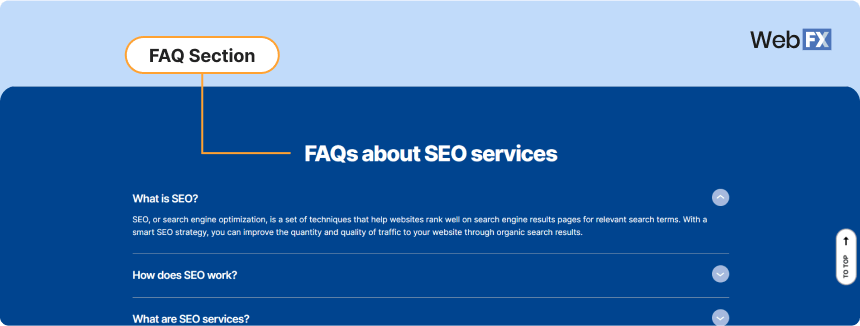
Another tip on how to increase organic traffic to your site is targeting “People Also Ask” and FAQ sections to directly address related user questions. Adding FAQ sections to your pages can increase your ranking power because of the following:
- It gives you additional opportunities to target relevant keywords.
- You answer your audience’s potential next search intent.
These sections add value to your page and can attract more organic traffic to your site by promptly answering user queries.
8. Create an enticing title tag and meta description
Search engines like Google display the most relevant excerpt from your page, which could be your title tag and meta description. It makes sense to optimize both to entice searchers to click your page.
Here are two best practices:
- For your title tag: Focus on keeping it within 60 characters. You’ll also want to integrate your core keyword at the front, so search engines and searchers know your listing is relevant. Make your title tag fun and enticing to encourage clicks!
- For your meta description: Keep it within 160 characters. Integrate your core keyword into the meta description. Make sure that it provides your audience with insight into what to expect on your page.
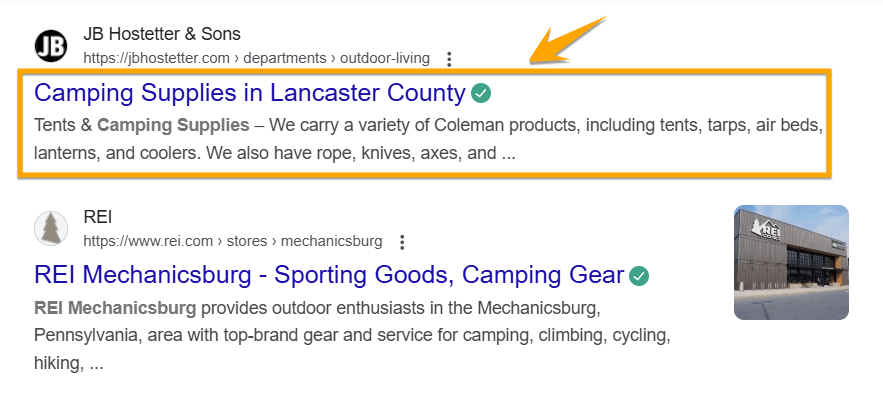
9. Conduct a technical SEO audit
Technical SEO makes your website easier for search engine crawlers to understand and index your site, making it an essential part of attracting organic traffic to your site. It deals with improving user-friendliness and resolving any technical issues that may inconvenience users.
Start your technical SEO journey by conducting a site audit. A site audit will help you check important backend elements of your site and identify any technical issues that need fixing, such as:
Want to learn how to conduct your own technical SEO audit? Check out our step-by-step guide!
How to Do a Technical SEO Audit in 7 Steps
10. Implement technical SEO best practices
Once you’ve conducted your technical SEO audit, you can continue to improve your site’s technical SEO health by implementing some best practices to keep your site in tip-top shape. Below are some technical SEO best practices you can use to improve your site for users and search engines:
- Use HTTPS instead of HTTP
- Ensure your site is mobile-friendly
- Optimize for Google’s Core Web Vitals
- Improve page speeds
- Identify and fix any duplicate content
- Identify and fix any broken links
- Conduct regular technical SEO audits to stay on top of any issues
11. Share your web pages on social media
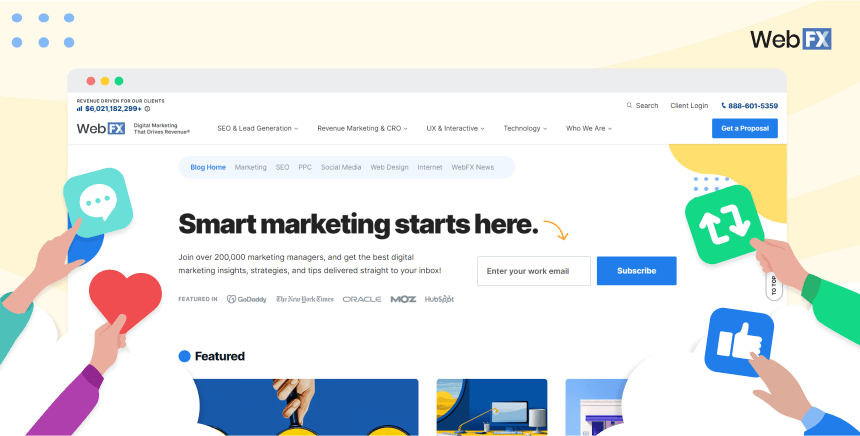
If you’re relying solely on SEO tactics to help you boost organic traffic, you’re missing out on other valuable methods that will help you drive more traffic.
Social media marketing provides another great opportunity to drive users to your site by linking to blog posts or article pages. You can share your pages on your social media profile to help drive organic traffic to your page. Not only does it drive your followers back to your website, but if they share your post, it drives new traffic to your page.
12. Earn backlinks
If you want to increase organic traffic outside of optimizations on your website, we have an excellent strategy for you: Earn backlinks. Backlinks are links to your site from other outside sites. These links help boost your website’s trust and authority in your industry.
Backlinks boost organic traffic in two ways. First, someone choosing to link to your site on their page leads traffic from their website to your website.
So, if a review blog links to your pizzeria in their blog post about top pizza places, anyone who clicks on that link to your site becomes new traffic for your business. Additionally, earning credible backlinks helps boost your trust and authority, which increases your ranking.
So, how can you earn more backlinks? The best way to earn backlinks is to create relevant, industry-related content. Your blog can serve as a great opportunity for you to earn backlinks from credible sites. Blogging is the best source for backlinks because:
- You can share them on social media
- You can write on various topics
- You can target numerous keywords
- You can share them in email newsletters
Since blogs are versatile, it creates various avenues and opportunities for you to reach people who will link back to your posts on their own page. Don’t be afraid to reach out to industry authorities and ask them to check out your latest blog post!
13. Revamp outdated content
The last strategy we’ll look at to boost organic traffic is revamping outdated content. When you publish content, it can become outdated over time. You may not drive as much traffic to your website because your competition has more updated pages.
If you want to increase organic search traffic to these pages, start by reoptimizing them. Reoptimizing old content enables you to breathe fresh life into pages on your site that aren’t performing well. So, what does reoptimizing entail?
It will depend upon the page. For some pages, just updating the information on it can help you increase organic traffic. Your industry may change, and the information on the page no longer becomes relevant, so you must update the content to reflect the current standards. You should look to update things like:
- Dates
- Statistics
- Outdated information
- The structure of your page based on user intent
Additionally, it may be that your page isn’t easily readable for your audience. You may need to reorder text into smaller paragraphs, add visuals to help break up the text, or use headings to make your pages easily skimmable. Revamping content will help you help your content perform better, so you can increase organic traffic to your website.
Grow your organic traffic and revenue with WebFX
Increasing your organic traffic is an important aspect of your marketing, because it drives a better ROI than most strategies.
If you need help with your SEO efforts, full-service digital marketing agencies like WebFX can provide the support you need to drive organic traffic to your website. We’re a Google Premier Partner that has helped our clients achieve success in their campaigns.
Don’t just take our word for it. Let our clients’ testimonials tell you how we’ve delivered their desired results.
Our team is pumped to learn more about your business, goals, and audience to increase your organic traffic and boost bottom-line growth. Contact us online or call us at 888-601-5359 to speak with a strategist about our SEO services!
-
 Celeste has worked in the online marketing space for twenty years. She has written for sectors including tourism, sustainability, education, lifestyle, food, and marketing. You can find her work featured by Green Building Media South Africa, Stodels Gardening, and The Post House Hotel. In magazines, you may have seen her in The Cape Times, Oprah South Africa, and The Property Magazine. While you can find her writing up on the latest SEO trends and exploring digital techniques during the day, her love of story-telling carries on in enriched games and books after hours.
Celeste has worked in the online marketing space for twenty years. She has written for sectors including tourism, sustainability, education, lifestyle, food, and marketing. You can find her work featured by Green Building Media South Africa, Stodels Gardening, and The Post House Hotel. In magazines, you may have seen her in The Cape Times, Oprah South Africa, and The Property Magazine. While you can find her writing up on the latest SEO trends and exploring digital techniques during the day, her love of story-telling carries on in enriched games and books after hours. -

WebFX is a full-service marketing agency with 1,100+ client reviews and a 4.9-star rating on Clutch! Find out how our expert team and revenue-accelerating tech can drive results for you! Learn more
Try our free Marketing Calculator
Craft a tailored online marketing strategy! Utilize our free Internet marketing calculator for a custom plan based on your location, reach, timeframe, and budget.
Plan Your Marketing Budget
Table of Contents
- 13 Tips on How to Increase Organic Traffic
- 1. Optimize Your Pages for Humans, Not Search Engines
- 2. Create a Blog
- 3. Publish Content Regularly
- 4. Optimize for AI-powered Search and Featured Snippets
- 5. Integrate Relevant Keywords on Your Page
- 6. Find New Keywords to Fill in Gaps
- 7. Address Search Intent by Minding “People Also Asked” Questions and FAQs
- 8. Create an Enticing Title Tag and Meta Description
- 9. Conduct a Technical SEO Audit
- 10. Implement Technical SEO Best Practices
- 11. Share Your Web Pages on Social Media
- 12. Earn Backlinks
- 13. Revamp Outdated Content
- Grow Your Organic Traffic and Revenue with WebFX

SEO Success with KOA

Proven Marketing Strategies
Try our free Marketing Calculator
Craft a tailored online marketing strategy! Utilize our free Internet marketing calculator for a custom plan based on your location, reach, timeframe, and budget.
Plan Your Marketing Budget





